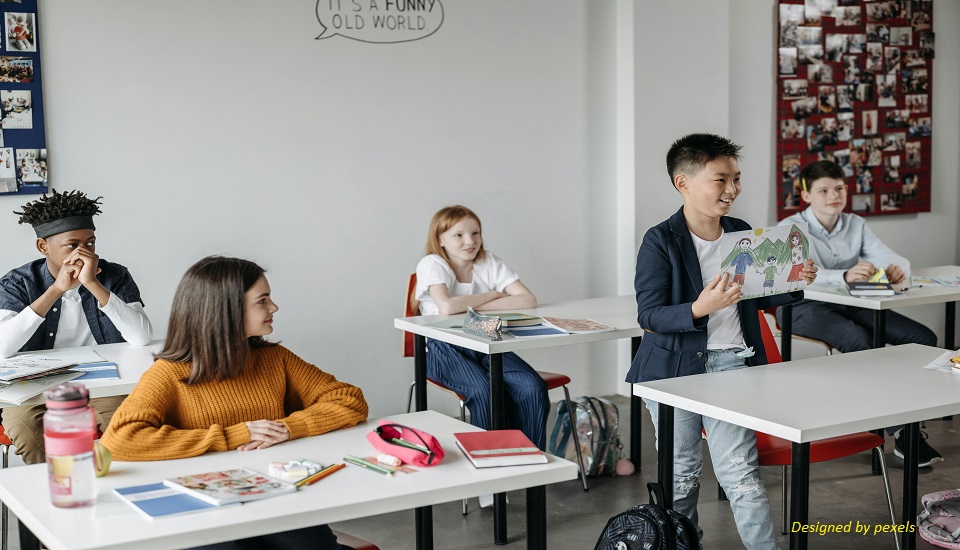From Shy to Confident: Interactive Methods for Encouraging English in Vietnamese Students
29th May 2025

Teacher coaching and mentoring programs in Vietnam play a significant role in helping students overcome the common challenge of speaking confidently when learning a new language. While many students may have a strong grasp of grammar and vocabulary, they often struggle with fluent and confident expression. Interactive speaking exercises not only improve speaking skills but also boost students' self-assurance. Read on to explore various interactive speaking exercises that can help students build their confidence and language abilities, making them more effective communicators in any classroom setting.
Effective Techniques to Help Students Gain Confidence in English
Here are a few effective techniques to help students gain confidence in English through interactive exercises and real-world practice:
1. Role-Playing Activities
Role-playing is one of the most effective ways to encourage students to speak and act out real-world scenarios. By simulating situations such as ordering food in a restaurant, attending a job interview, or discussing plans with a friend, students practice using language in context.
Why it Helps:
- Real-Life Context: Students are more likely to use the language effectively when they can practice it in a real-life scenario.
- Builds Confidence: Speaking in public might become more comfortable over time when roles and conversations are acted out in front of classmates.
- Improves Fluency: By practicing spontaneous conversations, students gain fluency and learn how to respond quickly in conversation.
These activities provide students with a safe space to make mistakes and experiment with language in a non-threatening environment.
2. Pair and Group Discussions
Pair and group discussions are fantastic for creating opportunities for students to speak without the pressure of speaking in front of the entire class. These smaller groups offer a less intimidating environment where students can interact more freely and comfortably.
Why it Helps:
- Peer Interaction: Speaking with classmates allows students to practice speaking in a relaxed, supportive setting.
- Encourages Participation: Students may feel more comfortable expressing themselves in smaller groups rather than speaking in front of everyone.
- Increases Comfort with Spontaneity: The informal nature of discussions allows for quick thinking and responses, helping students think on their feet.
With a topic in hand, students practice articulating their thoughts while receiving immediate feedback from peers.
3. Storytelling and Creative Presentations
How can teachers encourage students to speak English confidently? Storytelling exercises offer an excellent opportunity for students to practice organizing their thoughts and expressing ideas coherently. These exercises not only allow students to speak creatively and have fun but also encourage critical thinking about how to convey messages effectively, boosting their confidence in speaking English.
Why it Helps:
- Improves Organization of Ideas: Storytelling requires students to structure their thoughts, making their speech clearer.
- Boosts Creativity: It’s a fun and creative exercise that motivates students to speak out and practice new vocabulary.
- Enhances Public Speaking Skills: Presenting a story to the class helps students improve their speaking and presentation abilities.
You can take it further by having students create visual aids or slides to accompany their story, making it a more engaging presentation.
4. Debate Activities
Debates are excellent for students to develop both their speaking and critical thinking skills. Engaging in a debate requires students to articulate their opinions, provide evidence, and respond to counterarguments, all while maintaining composure and confidence. Students can also practice using persuasive language and argument structure through debates.
Why it Helps:
- Encourages Persuasive Speech: Debates help students practice presenting and defending their ideas convincingly.
- Improves Critical Thinking: Students gain the ability to reply to counterarguments and study subjects from a variety of angles.
- Builds Confidence Under Pressure: Speaking in a debate helps students gain confidence in high-pressure situations, where they need to think and speak quickly.
Give the debate a defined framework so that students have time to get ready and make their cases.
5. Interactive Language Games
Language games are not only fun but also highly effective in engaging students in spontaneous speech and communication. Games like 20 Questions, Charades, or Taboo can be adapted to fit any language level and encourage students to speak playfully and engagingly.
Why it Helps:
- Fun and Engaging: Games make speaking practice enjoyable, encouraging students to participate without fear of judgment.
- Increases Interaction: Many language games require collaboration, helping students learn how to communicate with others effectively.
- Improves Spontaneity: Games often require quick thinking, which improves students' ability to respond on the spot.
Allow students to create their own rules or modify the game to make it more engaging and tailored to their learning objectives.
6. Feedback and Reflection
Providing students with constructive feedback is essential for their growth and confidence. Reflective exercises, where students listen to their recordings or peer feedback, help them understand areas for improvement and identify what they did well.
Why it Helps:
- Self-Reflection: Listening to feedback and evaluating their performance allows students to understand their strengths and areas for improvement.
- Motivates Improvement: Positive feedback and specific suggestions motivate students to keep practicing and enhancing their speaking skills.
- Reinforces Confidence: Constructive feedback fosters a growth mindset, helping students build confidence as they progress.
Set clear, achievable goals for improvement in each session. Offer both positive reinforcement and actionable advice on how to improve.
Bottom Line
Innovative teacher training methods in Vietnam emphasize the importance of interactive speaking exercises to help students build confidence in their speaking abilities. These exercises create a safe and supportive environment where students can practice language skills without fear of making mistakes. By incorporating these methods, teachers foster a communicative and engaging classroom that empowers students to gain the confidence they need to excel in speaking and beyond.
Written By : Sophia Roberts